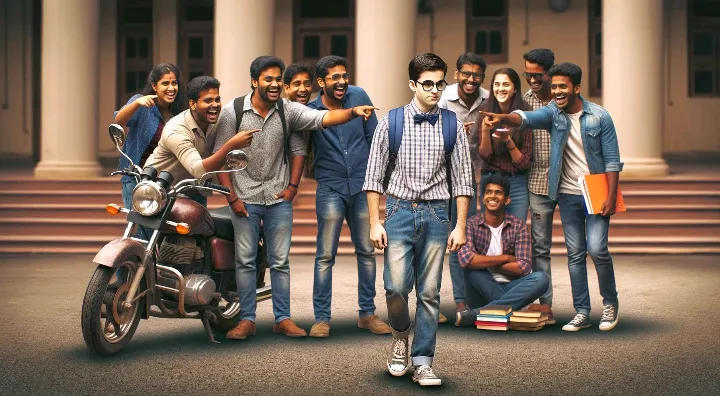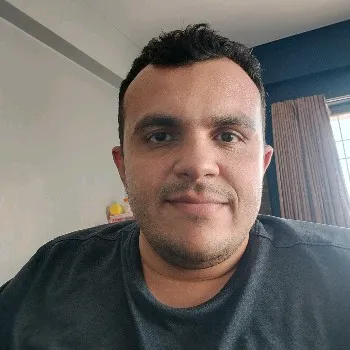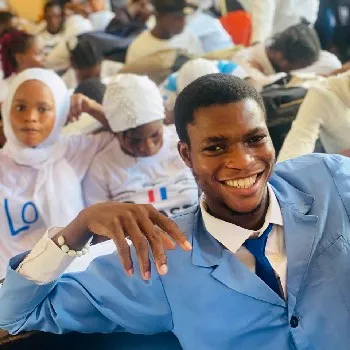Essay : Having fun…!
Image-credit : Created by a certain chatbot, based on my prompts.
—-----------------
It is nothing short of a tragedy to silently (and helplessly) realise that humans have always wanted to make a stooge out of someone else, and to barbarically ridicule that person, in order to seek pleasure for themselves.
Yes, I agree that it's necessary in life to be able to have a lighter sense of mood, and to jovially communicate among your peers.
But many a times, in various strata of the human society, having & making fun of someone (innocent) knowingly or unknowingly transforms into a sheer mental harassment, bullying, and ragging of that unfortunate victim.
One such incident, which had occurred in Jadavpur University, a few months ago, obliged me to write this essay.
So on August 9, 2023, Swapnodeep Kundu, an 18-year-old first-year student of Bengali Honours, fell from the balcony of the university’s main hostel and died.
Kundu was staying in the hostel as a guest of another resident named Monotosh, who had arranged his accommodation for a fee of Rs 1000.
Kundu’s father had met the prime suspect, Sourav Chowdhury, a former student of the university, at a tea shop outside the campus, where Chowdhury offered Kundu a guest stay in the hostel.
Chowdhury, along with six other students, allegedly subjected Kundu to severe ragging, forcing him to cut his hair in a specific style and asking him to provide physical details to his seniors.
They also made obscene comments and lewd gestures towards him. A student from Kashmir reportedly witnessed the entire incident and tried to prevent Kundu from jumping off the balcony, but failed.
The police registered a murder case on the basis of a complaint lodged by Kundu’s father and arrested Chowdhury and the six other accused students.
They are currently in jail and have been barred from entering the campus and hostel facilities until they are legally acquitted.
The National Human Rights Commission (NHRC) took a suo moto cognizance of the media reports and issued a notice to the university authorities, seeking a detailed report on the incident and the action taken against the culprits.
The university set up an internal inquiry committee to probe the death of Kundu and said that he was subjected to ragging before his death.
The committee also suggested the university authorities to demarcate hostel accommodation at the earliest and establish an anti-ragging squad to prevent such incidents in the future.
Another student of the university allegedly tried to die by suicide to save himself from police harassment amid the probe into the death case.
However, the university denied this, saying that the student was traumatised but did not attempt suicide.
According to a report by the University Grants Commission (UGC) of India, at least 25 students have died by suicide due to ragging in India between 2018 and 2021.
However, this number may not reflect the actual extent of the problem, as many cases of ragging go unreported or are not registered as suicides.
A study by Society Against Violence in Education (SAVE) estimated that nine students die of ragging every year in India.
Bullying is another form of harassment that affects many students in India.
A systematic review of literature found that bullying happens in India, and some risk factors for bullying and victimisation are typical to the Indian context.
A survey by The Teacher Foundation and Wipro Applying Thought In Schools (WATIS) revealed that 42% of students of Class 4 to 8 and 36% of Class 9 to 12 said they are subjected to harassment by peers on school campuses.
Cyberbullying was also a growing concern, especially during the pandemic. A report by McAfee Corp found that 85% of Indian children have been cyberbullied, the highest globally.
Bullying and ragging can have serious consequences for the mental and physical health of the victims, as well as the perpetrators.
Therefore, it is important to create a safe and supportive environment for students in schools and colleges, and to raise awareness and prevent such acts of violence.
In conclusion; the budding philosopher in me would only like to convey a message (if at all someone would care) that true happiness can be experienced by working on many constructive things in life, by making a routine out of it, and by helping others, by empathising with those around you and by socialising positively with them.
But why do we humans still crave for laughter at the stake of mocking some other humans?
When will this (virtually-passive) narcissistic desire of being happy by either making the other person unhappy in some manner, going to end?
Are we humans truly the sadistic-monsters about whose narrations, the fables of every faith and their scriptures are occupied?
Has the spirit of the devil always been more prominent somewhere within ourselves, compared to his utterly humble counterpart? If yes, then when are all of us going to subdue it?
© Kishan Trivedi
#essay
—-----------------
It is nothing short of a tragedy to silently (and helplessly) realise that humans have always wanted to make a stooge out of someone else, and to barbarically ridicule that person, in order to seek pleasure for themselves.
Yes, I agree that it's necessary in life to be able to have a lighter sense of mood, and to jovially communicate among your peers.
But many a times, in various strata of the human society, having & making fun of someone (innocent) knowingly or unknowingly transforms into a sheer mental harassment, bullying, and ragging of that unfortunate victim.
One such incident, which had occurred in Jadavpur University, a few months ago, obliged me to write this essay.
So on August 9, 2023, Swapnodeep Kundu, an 18-year-old first-year student of Bengali Honours, fell from the balcony of the university’s main hostel and died.
Kundu was staying in the hostel as a guest of another resident named Monotosh, who had arranged his accommodation for a fee of Rs 1000.
Kundu’s father had met the prime suspect, Sourav Chowdhury, a former student of the university, at a tea shop outside the campus, where Chowdhury offered Kundu a guest stay in the hostel.
Chowdhury, along with six other students, allegedly subjected Kundu to severe ragging, forcing him to cut his hair in a specific style and asking him to provide physical details to his seniors.
They also made obscene comments and lewd gestures towards him. A student from Kashmir reportedly witnessed the entire incident and tried to prevent Kundu from jumping off the balcony, but failed.
The police registered a murder case on the basis of a complaint lodged by Kundu’s father and arrested Chowdhury and the six other accused students.
They are currently in jail and have been barred from entering the campus and hostel facilities until they are legally acquitted.
The National Human Rights Commission (NHRC) took a suo moto cognizance of the media reports and issued a notice to the university authorities, seeking a detailed report on the incident and the action taken against the culprits.
The university set up an internal inquiry committee to probe the death of Kundu and said that he was subjected to ragging before his death.
The committee also suggested the university authorities to demarcate hostel accommodation at the earliest and establish an anti-ragging squad to prevent such incidents in the future.
Another student of the university allegedly tried to die by suicide to save himself from police harassment amid the probe into the death case.
However, the university denied this, saying that the student was traumatised but did not attempt suicide.
According to a report by the University Grants Commission (UGC) of India, at least 25 students have died by suicide due to ragging in India between 2018 and 2021.
However, this number may not reflect the actual extent of the problem, as many cases of ragging go unreported or are not registered as suicides.
A study by Society Against Violence in Education (SAVE) estimated that nine students die of ragging every year in India.
Bullying is another form of harassment that affects many students in India.
A systematic review of literature found that bullying happens in India, and some risk factors for bullying and victimisation are typical to the Indian context.
A survey by The Teacher Foundation and Wipro Applying Thought In Schools (WATIS) revealed that 42% of students of Class 4 to 8 and 36% of Class 9 to 12 said they are subjected to harassment by peers on school campuses.
Cyberbullying was also a growing concern, especially during the pandemic. A report by McAfee Corp found that 85% of Indian children have been cyberbullied, the highest globally.
Bullying and ragging can have serious consequences for the mental and physical health of the victims, as well as the perpetrators.
Therefore, it is important to create a safe and supportive environment for students in schools and colleges, and to raise awareness and prevent such acts of violence.
In conclusion; the budding philosopher in me would only like to convey a message (if at all someone would care) that true happiness can be experienced by working on many constructive things in life, by making a routine out of it, and by helping others, by empathising with those around you and by socialising positively with them.
But why do we humans still crave for laughter at the stake of mocking some other humans?
When will this (virtually-passive) narcissistic desire of being happy by either making the other person unhappy in some manner, going to end?
Are we humans truly the sadistic-monsters about whose narrations, the fables of every faith and their scriptures are occupied?
Has the spirit of the devil always been more prominent somewhere within ourselves, compared to his utterly humble counterpart? If yes, then when are all of us going to subdue it?
© Kishan Trivedi
#essay
Related Stories







